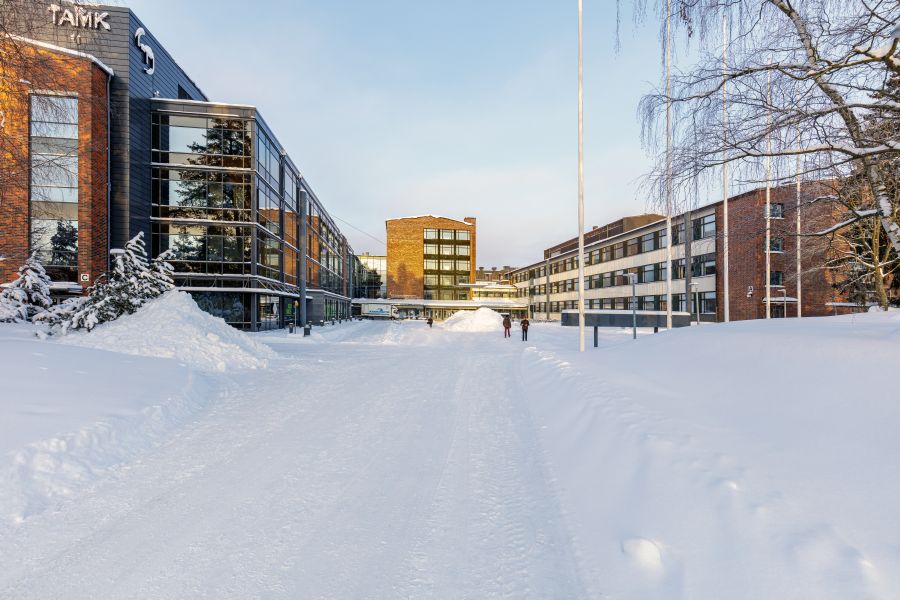The modern food system is a major factor in exceeding planetary boundaries and therefore it is an integral part of solving the sustainability crisis. Overcoming future systemic problems require collaboration among food-system related stakeholders, research and educational institutes.
Educational organizations are privileged to be in the front line of active future making. They have an opportunity to ensure a long-term impact of sustainability actions in society. Experts graduating from higher education institutions play an important role in the sustainable use of natural resources and advancing circular economy in their field. Especially in the hospitality industry, many graduates work in processes that can directly make a significant contribution to the food system sustainability transition and promote climate-friendly, healthy and nutritious food consumption.
In FUSILLI, Tampere University of Applied Sciences (TAMK) is a partner with the City of Tampere in cultivating a sustainable urban food system in the Tampere area. TAMK is a professional higher education institution oriented towards working life and RDI co-operation. TAMK belongs to the Tampere Universities community and our common goal is to get all our fields of research and education to participate in the sustainable development of society in concrete ways (TUNI 2022). Hospitality professionals graduating from our degree programme are typically working in managerial positions and as specialists and entrepreneurs in private companies and public sector organizations located in the Tampere region. Know-how obtained during education is crucial for local and national food service industry development.
Parallel to the activities of FUSILLI, we at TAMK School of Business and Media started to renew our Degree Programme of Hospitality Management curriculum. While mapping the future competences relevant to experts and managers working in hospitality industry, it became evident that the understanding of the food system and competencies in sustainable development are essential both from research and business perspectives.

Curriculum providing an impact on sustainability objectives
In a previous Horizon 2020 project, FIT4FOOD2030 (2017–2020), it was already recognized that embedding sustainable food system principles into the university degree programme curriculum provides an opportunity for a long-term impact [1]. Education is one concrete way to support the objectives of FUSILLI through policy guidance and to ensure continuity beyond the project period.
At TAMK, our future Hospitality Management education will be inspired by FUSILLI’s objectives and the EU’s FOOD2030 policy priorities. The importance of objectives and priorities convinced us to include course contents and learning goals related to nutrition for sustainable and healthy diets, climate-smart and environmentally sustainable food systems, and circularity of the across all stages of the food chain. In practice, we focus especially on providing our students with skills and competences in sustainable business models, promoting planetary diet food choices as well as ensuring a safe and just food system transition. These elements are integrated into the curriculum starting in August 2022.
Solving systemic problems requires re-thinking, co-innovation, and holistic insight
FUSILLI also drives us to make our TAMK Catering Studio Living Lab of Food & Sustainability contribute to sustainable urban food systems as a participatory platform together with stakeholders: people, private sector, academia and city-level decision making. Participating in the Living Lab activities will be part of each student’s innovation education – through learning by doing. We commit to ensure that food system design thinking and the concept of strong sustainability implementation will flourish and continue also after the FUSILLI project period.
We encourage other educational organizations to consider sustainable food system related educational needs in their curriculum renewal processes. Learning questions could be: “What kind of future does the current curriculum or learning goals create?” or “What kind of future does the learning community want to build?” [2]. Education is an effective tool to build a sustainable future.
Authors: Sanna Luoto, Ella Kallio, Tuija Heikkilä, Hanna Ylli & Mikael Lindell, TAMK School of Business and Media
Credits for image: Marko Kallio, Skyfox
References:
[1] European Commission, Directorate-General for Research and Innovation, 2021. Research & innovation for accelerating food system transformation: Operationalising FOOD 2030 through living labs. Publications Office. Read on 10.2.2022. https://data.europa.eu/doi/1.2777/374723
[2] Puranen, K. 2022. Nyt aletaan opettaa systeemistä muutosta. Mitäääh? Opettaja 1/2022. Read on 10.2.2022. https://www.opettaja.fi/tyossa/nyt-aletaan-opettaa-systeemista-muutosta-mitaaah/
